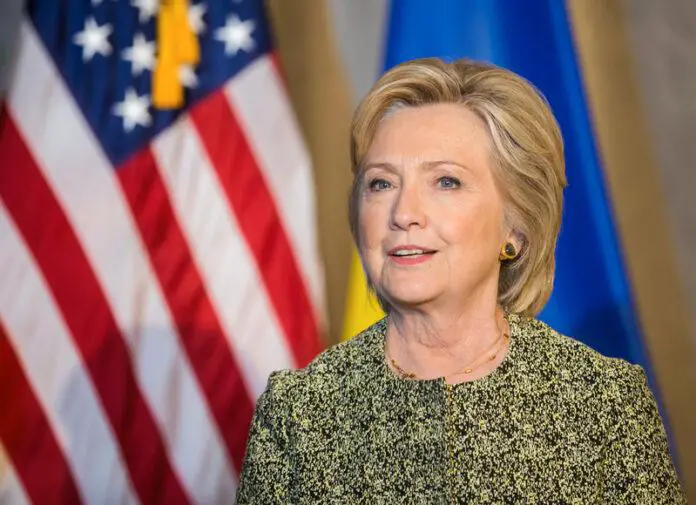Hillary Clinton has raised alarms about an impending disinformation campaign aimed at Vice President Kamala Harris this month.
In a recent interview with Firing Line host Margaret Hoover, the former Secretary of State cautioned that efforts to undermine Harris’ public image will likely intensify this month. Clinton referred to the attack as an “October surprise,” suggesting that it would “distort and pervert Kamala Harris” in an effort to sway public opinion before the election.
Clinton’s warning points to the possibility of a coordinated disinformation effort designed to mislead voters about Harris’ record and character. Drawing from her own experiences during the 2016 election, Clinton noted that such tactics often rely on conspiracy theories and false narratives to damage the reputations of political figures. She stated that Vice President Harris, as a high-profile figure, would be a prime target for these efforts as Election Day approaches.
Clinton referenced the now-debunked “Pizzagate” conspiracy theory as an example of how far-reaching and dangerous disinformation can become. The 2016 scandal falsely accused her of running a child trafficking operation out of a Washington, D.C. pizzeria, a story that spread rapidly through social media and fringe websites. “The crazy story about me running a child trafficking operation out of a basement of a pizzeria,” Clinton said, reflecting on the absurdity of the claims. The theory gained so much traction that a North Carolina man drove to the pizza parlor with an assault rifle, intending to “rescue” the nonexistent children.
What began as a false online narrative eventually led to a violent incident, highlighting the tangible dangers of viral misinformation. Clinton used this example to illustrate how quickly falsehoods can escalate, warning that a similar campaign of disinformation could be used against Harris in the lead-up to the 2024 election. “Don’t laugh,” Clinton told the crowd, stressing the seriousness of such lies and how easily they can gain traction.
Clinton noted that the rapid spread of these conspiracy theories is often enabled by social media platforms and fringe news outlets. “It starts online, often on the dark web,” she said, explaining how disinformation migrates from obscure corners of the internet into mainstream discourse. Once picked up by partisan media outlets, these stories can spread like wildfire, reaching a much wider audience and gaining a level of credibility that they do not deserve.
Clinton’s concerns aren’t just limited to domestic disinformation. She also raised the possibility of foreign interference in the 2024 election, echoing concerns voiced by cybersecurity experts in recent years. Clinton suggested that countries like Russia, Iran, and China could take advantage of social media platforms to spread false narratives about candidates, including Harris. “The digital airwaves will be filled with misinformation,” Clinton predicted, urging vigilance in combating falsehoods.
In the 2016 election, Russian operatives used social media to fuel divisive narratives and disinformation campaigns aimed at undermining trust in the electoral process. Clinton argued that similar tactics might be employed now, and that foreign actors could fuel narratives specifically targeting Harris. According to Clinton, social media platforms must play a proactive role in monitoring and curbing the spread of disinformation, but she also called for the media to maintain a consistent narrative in highlighting the risks posed by false information.
“The press needs a consistent narrative about the danger Trump poses,” Clinton said, stressing the need for journalists to be diligent in fact-checking and exposing misinformation before it gains widespread acceptance. She urged the public to remain skeptical of outlandish claims, especially those that seem designed to incite fear or doubt.
Although Clinton acknowledged that she doesn’t know exactly what form the disinformation campaign against Harris would take, she expressed certainty that something will surface. Clinton encouraged voters, the media, and political leaders to stay alert and be prepared to counter any false narratives that may emerge.
Historically, “October surprises” have referred to last-minute revelations or scandals that can influence the outcome of an election. Clinton believes that Harris, as the first female vice president of color, could be particularly vulnerable to disinformation campaigns that exploit biases and attempt to stoke division among voters. Clinton warned that these efforts could be part of a broader strategy to destabilize the political landscape by focusing on Harris’s race, gender, or past political record.
Clinton’s remarks come at a critical time as the 2024 election nears and concerns about disinformation continue to grow. Recent elections, both in the U.S. and abroad, have shown how powerful and pervasive false information can be in shaping public opinion and voter behavior.
CBS News recently described a disinformation campaign reported by Microsoft, targeting Vice President Harris and led by Russia-linked actors. The tactics include fabricated videos falsely accusing Harris of involvement in a hit-and-run accident. Iranian and Chinese groups are also involved, aiming to disrupt the U.S. elections.
A video circulated widely on social media in September, attracting millions of views, but some viewers were skeptical. It showed a young Black woman who accused Vice President Harris of leaving her paralyzed in a hit-and-run accident in San Francisco 13 years ago.
In a tearful account from a wheelchair, the woman said she could no longer stay silent and lamented that her childhood had been cut short.
Soon after the video was posted on September 2, social media users began pointing out inconsistencies. The supposed news channel, San Francisco’s KBSF-TV, didn’t exist. A website for the channel, created just a week earlier, contained plagiarized articles from legitimate outlets. The X-ray images in the video were lifted from medical journals, and the woman’s name was spelled inconsistently between the video and the text on the website.
The caution was warranted, according to Microsoft’s threat intelligence report, which confirms that the made-up story was disinformation from a Russia-linked troll farm.
“We’ve seen it before, and we’re seeing it again,” Clinton said, drawing from her own experience in 2016. “This is dangerous stuff,” Clinton reiterated, urging all Americans to be on guard against attempts to manipulate the truth.

